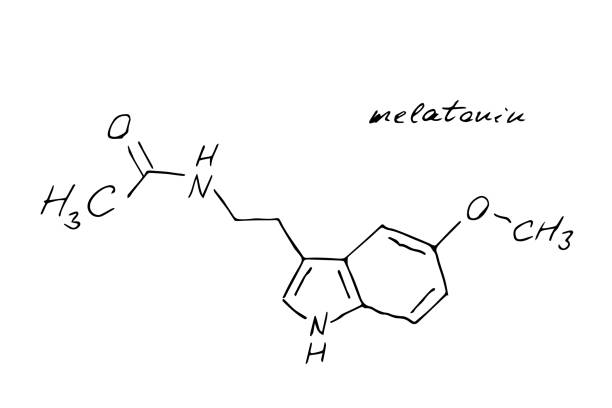Melatonin: a hormone with numerous benefits
Melatonin is a hormone produced naturally by the human body. It is secreted by the pineal gland, located in the brain, and plays an important role in regulating sleep and circadian rhythms. But did you know that melatonin can also be used as a dietary supplement for its many benefits? In this article, we'll explore the origins of melatonin, its different uses as a dietary supplement and the scientific research that supports its health benefits.
Origin of melatonin
Melatonin was discovered in 1958 by the American dermatologist Aaron Lerner. He noticed that this hormone played an important role in skin pigmentation. Its name comes from the Greek word "melas" meaning black, in reference to its ability to stimulate the production of dark pigments in the skin. However, later research showed that melatonin is also present in many other organs and tissues of the body, and that it performs much more important functions than skin pigmentation alone.
Melatonin production is influenced by light. The pineal gland produces this hormone in response to darkness, and its production decreases in the presence of light. This is why melatonin is often called the "sleep hormone", as it plays a crucial role in regulating the sleep-wake cycle.
Use as a food supplement
Melatonin is mainly used as a dietary supplement for its effects on sleep, but it can also be beneficial for other aspects of health.
Sleep
The main benefit of melatonin as a dietary supplement is its ability to improve sleep quality. Many people suffer from sleep disorders such as insomnia, jet lag or night shifts, and melatonin can help them get back to restful sleep. Several studies have shown that taking melatonin as a dietary supplement can reduce the time it takes to fall asleep, improve sleep quality and reduce night-time awakenings. According to a French study published in the Journal of Sleep Research, melatonin can also help regulate sleep disorders in people with neurodegenerative disorders such as Parkinson's or Alzheimer's disease.
Antioxidant
Melatonin is also a powerful antioxidant. It can help protect cells against the harmful effects of free radicals, which are responsible for cell ageing. What's more, melatonin can easily cross the blood-brain barrier, making it particularly beneficial in protecting the brain against oxidative damage. Studies have shown that taking melatonin as a dietary supplement can improve cognitive function in the elderly and reduce the risk of neurodegenerative diseases such as Alzheimer's and Parkinson's.
Boosting the immune system
Melatonin can also boost the immune system and help fight infection. In fact, this hormone stimulates the production of immune cells and can therefore help fight viruses and bacteria. According to a study published in the Journal of Pineal Research, taking melatonin as a dietary supplement can be effective in boosting the immune system in the elderly and in people suffering from HIV.
How do I take melatonin as a dietary supplement?
Melatonin is generally taken in capsule, tablet or liquid form. It is recommended to take it 30 minutes to 1 hour before bedtime, to help regulate the sleep-wake cycle. It is important to follow the dosages recommended by the manufacturer and not to exceed the recommended daily dose, which is generally 1 to 3 mg. For optimum results, it is best to take melatonin over a period of 3 to 4 weeks.
Precautions to be taken
Melatonin is generally considered safe in the short term, but it is important to take a few precautions before taking it as a dietary supplement. It is advisable to consult a doctor before starting melatonin supplementation, especially if you suffer from health problems or are taking other medications. What's more, melatonin can interact with certain medications, so it's essential to check with your doctor or pharmacist before taking it.
Conclusion
Melatonin is much more than just a sleep hormone. It plays a crucial role in many bodily functions, including regulating sleep, protecting against oxidative damage and boosting the immune system. Taking melatonin as a dietary supplement can therefore be beneficial to health, but it is always important to follow the dosage recommendations and take precautions before starting any supplementation.
We hope this article has given you a better understanding of the benefits and uses of melatonin as a dietary supplement. Don't forget to consult your doctor before starting any supplementation, and to seek advice from a reliable source before buying any food supplements containing melatonin.
Sources :
- Journal of Sleep Research - Melatonin for the treatment of sleep disorders in the elderly.
- Journal of Pineal Research - Immunomodulating effects of melatonin.
- Brain Research Reviews - Melatonin as an endogenous antioxidant: implications for health.
Restorative sleep
Transform your nights with our complex sleep formula, designed to promote deep, restorative sleep. This unique combination of natural ingredients calms the mind, promotes relaxation and helps you get back to a peaceful night's sleep. Rediscover each day with renewed energy.












